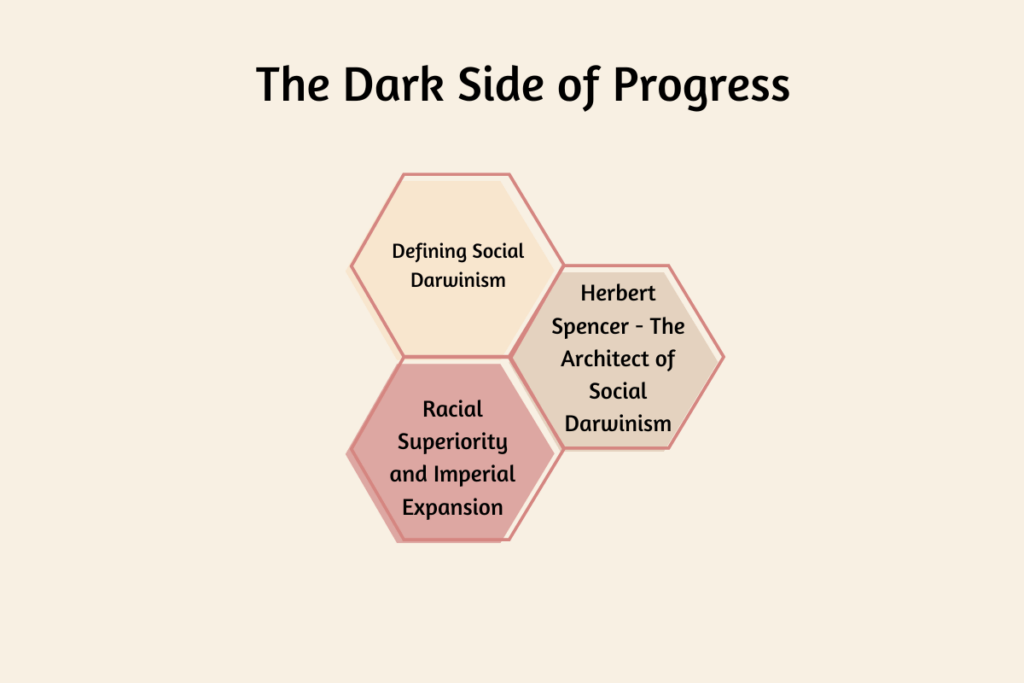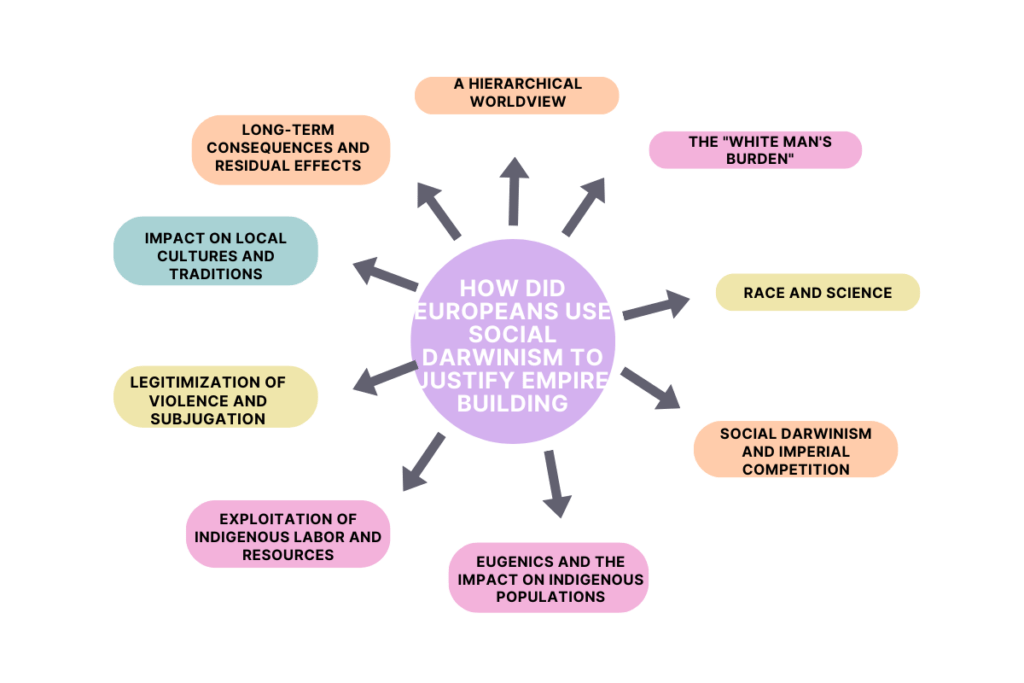Introduction
Social Darwinism: In the annals of history, the rise of European empires and their global dominance is often romanticized with tales of exploration, discovery, and the pursuit of wealth. However, underlying these narratives lies a darker side: the ideology of Social Darwinism. This pernicious belief system justified empire-building by embracing notions of racial superiority and the survival of the fittest in the human realm. In this article, we will explore how Europeans exploited Social Darwinism to validate their imperial ventures and analyze the impact it had on colonized societies.

Defining Social Darwinism
Social Darwinism, a term coined by Herbert Spencer, refers to the application of Charles Darwin’s theory of natural selection to human societies. It asserts that in the struggle for existence, the fittest individuals and races are destined to prosper, while the weaker ones are destined to perish. European imperial powers, influenced by the prevailing scientific and intellectual climate of the late 19th century, seized upon Social Darwinism‘s principles to rationalize their colonial activities.
Herbert Spencer – The Architect of Social Darwinism
A key figure in the development of Social Darwinism was Herbert Spencer, a British philosopher and sociologist. Spencer popularized the term “survival of the fittest” and applied it to human society, arguing that stronger and more advanced nations were destined to conquer and dominate weaker ones. His influential work, “Principles of Sociology,” laid the groundwork for the justification of European imperialism by connecting the concept of progress with the conquest of so-called “primitive” societies.
Racial Superiority and Imperial Expansion
Social Darwinism fueled the belief in the inherent superiority of the white European race, providing the basis for justifying their conquests. Prominent figures such as Cecil Rhodes, a British imperialist and founder of the De Beers diamond company, openly espoused such views. Rhodes believed in the natural superiority of the Anglo-Saxon race and argued that their territorial expansion was a natural and necessary progression for the advancement of civilization.
How did Europeans use Social Darwinism to justify empire building

A Hierarchical Worldview
Social Darwinism perpetuated the idea of a hierarchical division among races, placing Europeans at the apex. Based on the belief that Europeans were the most “advanced” race, they justified their colonization of indigenous peoples as a means of uplifting and civilizing the “savage” populations. This viewpoint was epitomized by British philosopher and anthropologist Sir Edward Tylor, who argued that the superiority of Western civilization necessitated the subjugation and assimilation of primitive cultures.
The “White Man’s Burden”
The concept of the “White Man’s Burden” ratified the alleged necessity for European imperial powers to dominate and protect the “lesser” races. Rudyard Kipling popularized this notion in his eponymous poem, which called upon white nations to bring their supposedly superior civilization to the “uncivilized” world. Under the guise of benevolence and a duty to uplift the oppressed, Europe justified its colonial endeavors while exploiting the resources and labor of the colonized countries.
Race and Science
During the height of European imperialism, scientific racism flourished. Intellectuals, such as French biologist Georges Vacher de Lapouge and British psychologist Francis Galton, attempted to legitimize their prejudiced views by linking race and intelligence. The Eugenics Movement gained traction, advocating for selective breeding policies to improve the “racial stock” of nations. These pseudo-scientific justifications further fueled the imperialist agenda and influenced policies designed to eradicate “undesirable” traits in European populations.
Eugenics and the Impact on Indigenous Populations
Social Darwinism also laid the groundwork for the rise of eugenics, which aimed to improve the genetic quality of human populations through selective breeding. Europeans used this pseudo-scientific ideology to justify the forced assimilation, cultural erasure, and even genocide of indigenous populations in their colonies. Tragically, these actions perpetuated the myth of European superiority and led to immeasurable suffering and loss of life across colonized region
Social Darwinism and Imperial Competition
As European powers vied for dominance on the global stage, Social Darwinism fueled intense competition amongst nations. The emphasis on survival of the fittest led to a race to acquire colonies and resources, providing the European nations with economic advantages, geopolitical influence, and access to new markets. This competitive drive further justified empire building as a means to ensure national strength and prosperity.
Exploitation of Indigenous Labor and Resources
Under the pretext of Social Darwinism, European powers exploited the labor and resources of indigenous populations. The systematic extraction of resources from colonized territories, such as minerals, crops, and human capital, became the lifeblood of European economies. The notions of racial superiority and the survival of the fittest allowed Europeans to dehumanize and exploit indigenous peoples, reinforcing the perception that they were destined to serve their European masters.
Legitimization of Violence and Subjugation
Social Darwinism provided a moral basis for the use of violence and subjugation in the pursuit of empire building. The belief that stronger nations were biologically destined to conquer weaker ones justified the brutal suppression of resistance and the imposition of European authority. The indigenous populations were often portrayed as inherently inferior, allowing Europeans to employ oppressive measures, including forced labor, forced conversion to Christianity, and cultural assimilation, all in the name of progress and civilization.
Impact on Local Cultures and Traditions
European colonization, justified by Social Darwinist principles, had a profound impact on the preservation and perpetuation of local cultures and traditions. The imposition of European values, institutions, and systems caused the erosion of indigenous languages, customs, and knowledge systems. The loss and erasure of cultural diversity remain significant consequences of empire building driven by Social Darwinism.
Long-Term Consequences and Residual Effects
The legacy of empire building justified by Social Darwinism continues to impact the world today. The borders and divisions enforced by colonial powers often disregarded ethnic, tribal, and cultural affiliations, resulting in post-colonial conflicts and tensions. Moreover, the economic disparities and resource exploitation laid the groundwork for ongoing global inequalities.
Case Studies
Social Darwinism and the Scramble for Africa
The Scramble for Africa during the late 19th and early 20th centuries exemplifies the impact of Social Darwinism on Europe’s imperial ambitions. European nations, including Britain, France, and Germany, asserted their dominance over Africa through military conquest, economic exploitation, and the establishment of colonies. Justifications such as the “civilizing mission” were often deployed to legitimize their actions, relegating African cultures and societies as backward and in need of the guiding hand of European rule.
Case Study: India under British Colonial Rule
India, once known as the “jewel in the crown” of the British Empire, became a prime example of how Social Darwinism reinforced oppressive imperial practices. British colonial administrators depicted Indian society as inferior, labeling its tradition and culture as backward and barbaric. The British exploited these beliefs to justify their imposition of Western values and institutions, leading to the dismantling of indigenous industries, the suppression of indigenous knowledge, and the subjugation of local populations.
Conclusion
The utilization of Social Darwinism as a moral justification for European imperialism cannot be understated. This ideology propagated the notion of racial superiority and the right of Europeans to impose their rule upon “lesser” populations. The detrimental consequences of empire building based on these principles are still felt today. Recognizing and acknowledging this history enables us to critically analyze the lingering effects of Social Darwinism and strive for a more equitable and inclusive world
Samrat is a Delhi-based MBA from the Indian Institute of Management. He is a Strategy, AI, and Marketing Enthusiast and passionately writes about core and emerging topics in Management studies. Reach out to his LinkedIn for a discussion or follow his Quora Page
